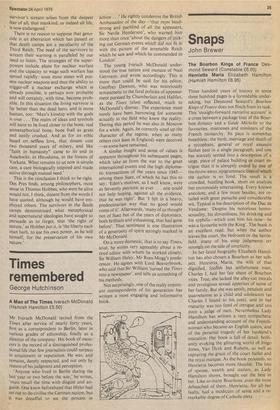Snaps
John Brewer The Bourbon Kings of France Desmond Seward (Constable E6.00) Henrietta Maria Elizabeth Hamilton (Hamish Hamilton £6.95) Three hundred years of history in some three hundred pages is a formidable undertaking, but Desmond Seward's • Bourbon Kings of France does not flinch from its task. This 'straight-forward narrative account' is a cross between a package tour of the Bourbon dynasty and a Guide Michelin to the favourites, mistresses and ministers of the French monarchy. Its pace is somewhat breathless: the birth, marriage and death of a sycophant, general' or royal assassin flashes past in a single paragraph, and one has scarcely settled into a description of a siege, piece of palace building or court intrigue than it is abruptly ended by one of the throw-away, epigrammatic lines of which the author is so fond. The result is a crowded, bustling book, short on analysis but enormously entertaining. Every known anecdote, and a few more besides, are retailed with great panache and considerable wit. Typical is his description of the Duc de Vendome: 'Despite his notorious homosexuality, his slovenliness, his drinking and his syphilis—which cost him his nose—he was a favourite with the King'. The book is an excellent read, but when the author leaves the court, the bedroom or the battlefield, many of his snap judgments err strongly on the side of simplicity.
In her latest biography Elizabeth Hamilton has also chosen a Bourbon as her subject. Henrietta Maria, the wife of that dignified, foolish but unfortunate man, Charles I, had her fair share of Bourbon vices. True, she lacked the alley-cat morals and prodigious sexual appetites of some of her family. But she was spoilt, petulant and quarrelsome as a child and adolescent (as Charles I found to his cost), and in her maturity was too fond of intrigue and too poor a judge of men. Nevertheless Lady Hamilton has written a very sympathetic and understanding account of the Frenchwoman who became an English queen, and of the personal tragedy of her husband's execution. Her book is full of detail, brilliantly evoking the glittering world of !nig° Jones, Van Dyck and Rubens, as well as capturing the grace of the court ballet and the royal masque. As the book proceeds, so Henrietta becomes more likeable. The loss of spouse, wealth and station, as Lady Hamilton shows, brought out the best in her. Like so many Bourbons, even the most debauched of them, Henrietta, for all her faults, had a modicum of sense and a remarkable degree of Catholic piety.


































 Previous page
Previous page